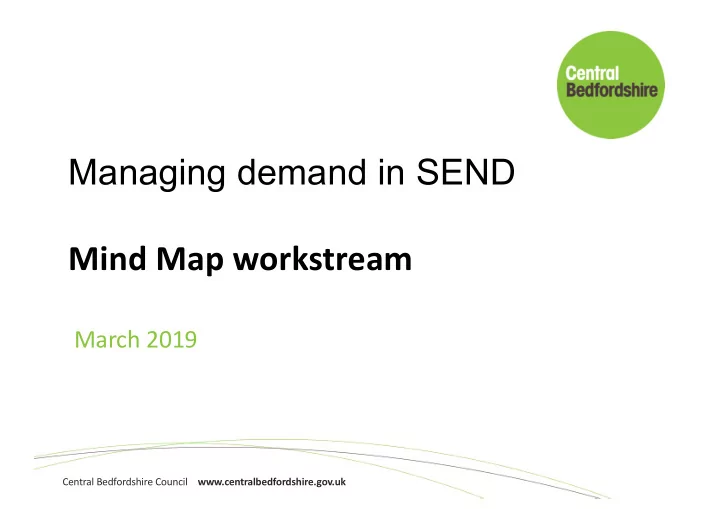

Managing demand in SEND Mind Map workstream March 2019 Central Bedfordshire Council www.centralbedfordshire.gov.uk
Contents Title Slide number Workstream rationale 3 Workstream reach 4 - 5 Activity 6 Outcomes 7 Feedback 8 - 9 Next Steps 10 Central Bedfordshire Council www.centralbedfordshire.gov.uk
Workstream rationale • Tackling emotional awareness at a whole school level from the beginning of school education • Work with participating schools to develop a revised behavioural approach, focused on reducing behavioural challenges in primary settings and creating an environment where children are able to learn Slide 3 Central Bedfordshire Council www.centralbedfordshire.gov.uk
Workstream Lawnside reach Shefford Lower Clipstone Brook Caddington Beecroft Village Academy Studham Slip End Lower Slide 4
Workstream reach By year group R Year 1 Year 2 Year 3 Year 4 Year 5 Year 6 Year 7 Year 8 Year 9 Year 10 Year 11 By outcome: • Reduction in children escalating to EHCP • Reduction in fixed term and permanent exclusions By staff: • Pastoral support • Whole school capacity building • School training Slide 5 Central Bedfordshire Council www.centralbedfordshire.gov.uk
Activity Staff inset: • Explains the neuroscience behind why children behave the way they do; • Outlines the need to ‘settle the snow’ in order to access learning; • Outlines the need for a whole school approach to emotional well being (we • are unique in this); Teaches the whole school how and why to use the tools (no dilution). • Parent workshop: • Reinforces the need for ‘positive parenting’ (consistency of approach, • boundaries etc); Outlines the work the school is doing to support emotional wellbeing. • School toolkit for all children: • Caterpillar club - explicitly teaches a wide range of feelings/emotions/calm • Feeling flowers – feelings barometer that indicates the affective state of • each child/develops child-teacher relationships; Talk time – encourages children to talk/knowledge that they will be heard; • Shield of Resilience – explicitly teaches resilience/ choice to ‘let things • bounce’/keep going Slide 6 Central Bedfordshire Council www.centralbedfordshire.gov.uk
Outcomes Early intervention strategy : pro-active rather than re-active; life skills • Whole school approach and language around emotional well being – re- • direction of behaviour Pupil’s capacity to access learning increased • Easily embedded into the whole school daily curriculum – no dilution • Pupils use their words rather than their behaviour to communicate • need/anxiety. Develops resilience – easy to reinforce (stickers, certificates, assemblies) • High needs children are not singled out as ‘bad’ • Alternative behaviour ‘management’ strategies employed (rather than • EHCP route). Promotes and enables calmer classrooms (Casey) • Slide 7 Central Bedfordshire Council www.centralbedfordshire.gov.uk
Feedback Slide 8 Central Bedfordshire Council www.centralbedfordshire.gov.uk
Clipstone Brook Lower School – Children’s Comments: Caterpillar stories are good because they help you talk about your • feelings (Yr 1) They help you control your feelings really well. (Yr 2) • It tells us that we can tell people how we feel and helps us be open • about it (Yr 2) I really like it because it really explains how feelings are all different and • how we can work on fixing a problem to do with our feelings (Yr 3) It’s really good. It helps me not worry about my feelings, like when I am • angry I can just talk about it, not worry, and control it. (Yr 4) Slide 9
Next steps • Sustainability – • all tools are left with schools to maintain on going use • very easy to disseminate usage within school (whole school training) • ‘Shield of Resilience’ workshops available every 2 years (minimal cost) • development of annual schools’ forum to share best practice amongst ‘Mind Map’ schools and ‘non Mind Map’ schools • Programme to be developed for pupils up to year 8 • Development of mentoring programme Slide 10 Central Bedfordshire Council www.centralbedfordshire.gov.uk
Recommend
More recommend